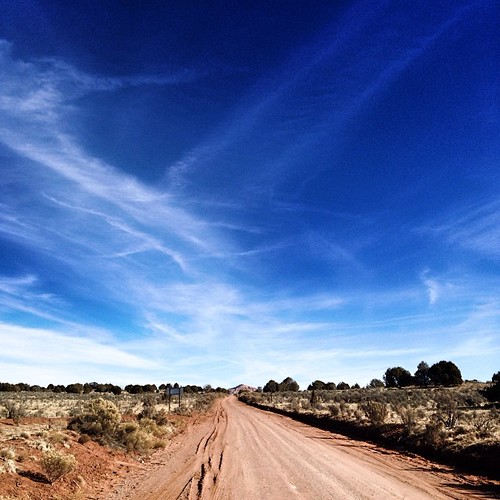
“The Long Road” a photo by Kris Krug.
New movements naturally experience a period of exploration, debate, and adoption of new terms. Over time, the use those terms tend to fade away as other new terms are introduced.
About a decade ago, I was intimately involved in exploring the first phase of sharing, social media, from a business context. Today, ten years later, as the physical world is being shared more efficiently through technology, I’m observing similar patterns of change.
When we saw new types of media-sharing tools that didn’t require technical know-how emerge, it changed the game. We considered and used terms like: Web 2.0, Citizen Media, User Generated Content, Social Computing, Business Blogging, People Media, Social Media, Pinko Marketing, Social Networking, Community Marketing, Social Enterprise, and Social Business. Some of those terms were adopted, and some, thankfully, were left behind.
As the first phase of sharing matured, it became referred to simply as “social media.” Even that identififaction is fading into the background as it has become nearly fully integrated into mainstream communications. One can hardly find a mainstream news source that doesn’t integrate social media tightly woven into communication, such as websites, email, news, TV, glasses and “whatever-Apple-wrist-watch-comes-next.”
In our current movement, there’s many-a-term being used to describe what’s happening. Here’s a list of examples, in alphabetical order:
- Blue Economy
- Caring Economy
- Circular Economy
- Collaborative Consumption
- Collaboration Economy
- Collaborative Economy
- Consumer to Consumer
- Connection Economy
- Cooperative Economy
- Crowd Economy
- Freelance Economy
- Frugal Economy
- Gift Economy
- Gig Economy
- Green Economy
- Human Economy
- Local On Demand Economy
- Maker Movement
- MicroEntrepreneur Economy
- Microtransaction Economy
- New Economy
- On Demand Economy
- P2P Economy
- Peer Economy
- Purpose Economy
- Rental Economy
- Serf Economy
- Servitude Economy
- Shadow Economy
- Shared Economy
- Sharing Economy
- Solidarity Economy
- Subscription Economy
- The Mesh
- Trust Economy
- Zero Waste Economy
- 1099 Economy
Edit: Connection Economy, and Solidarity Economy added March 26, 2014, Collaboration Economy added March 28. Added Purpose Economy on April 1, 2014, Caring Economy added Jan 2015, thanks Mila and 1099 Economy, On Demand Economy, ht Angus Nelson, Rental Economy by John Rogers and Fred Wilson added Jan 2015. June 2015 added “consumer to consumer” and “local on demand economy.” Added Human Economy courtesy of Bryan Kramer July 2015. I added Serf, Servant, and Microtransaction Economy, after this long post from Olivier.
As new terms are being coined by multiple entities, there’s clearly growing confusion in the market. Rachel Botsman has taken a swing at clearly articulating the differences in this FastCompany article. She rightfully points out that the terms have different shades of meaning, intent and perspective to the parties that use them.
Sure, I’ve invested a lot on the term Collaborative Economy, as it works well for what we’re trying to accomplish. But a few years from now, we’ll all look back and laugh at all the terms we used, as the prefix of the “X Economy” fades away and it returns to just being the economy. That’ll be proof that we’ve succeeded.
By nature, new movements can be massive, but they impact each person in a unique way. As a result, movements jostle over the terms to be used until they are refined into a common market language. Ultimately, however, when movements are successful, the descriptors become irrelevant, as what was once a disruption becomes the way of life.
Each term will resonate more with certain groups, but in the end, if we’re successful, it’s just the Economy.
Edit: There’s an additional discussion on Facebook.
Perhaps it should be described as the “collaborative shift” (or similar) of the economy? While, in the big picture, we are just in a transitional period of economic maturation, it is worth noting the extreme shift from industrial practices.
For your list: we here in Europe call it the Interdependent Economy of Society30.
Thank you Ronald.
There’s no shortage of terms Mike, no shortage.
Much like social business, digital business, etc. all boil down to business, I do think there is value in exploring the niche segments of business. The term is not important unless it’s your brand. The ideas, actions and transformations which results from it are what is important.
You got it Tim. It’ll take a few years –but in the end, it’s just integration as we end up left-of-center.
love it. its a fun project to come up with a band name or name for your company. whats important is the actual music you make, what your actually does.
Also, some seek to ban the word “Ride Sharing” http://www.buzzfeed.com/charliewarzel/lets-all-join-the-ap-stylebook-in-killing-the-term-ride-shar#.qdYw6B8Pk